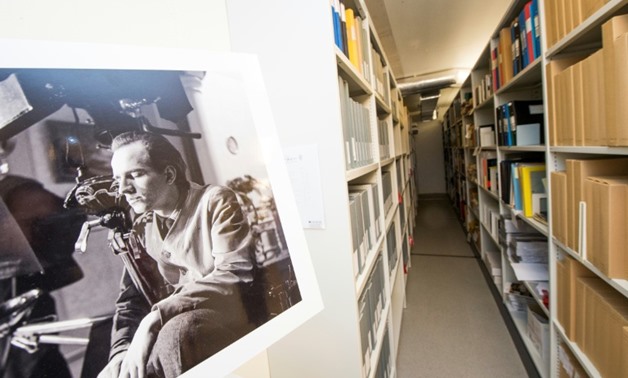
A picture take on November 8, 2016 shows the Ingmar Bergman archives located at the Film House in Stockholm-AFP / JONATHAN NACKSTRAND
11 July 2018: With some 60 films to his name, many of which have become classics of psychological and conjugal torment, Ingmar Bergman's filmography showcases both his stylistic range and striking thematic consistency.
Here are five key works from a six-decade career that has marked the history of cinema and influenced generations of directors to this day.
- 'The Seventh Seal' (1957) -
Bergman's period masterpiece set at the time of the Crusades contains one of his now iconic scenes: a knight playing a game of chess with Death.
It encapsulates Bergman's central concerns -- how faith is sustained in the face of evil and human misery.
Picking up a prize at Cannes and quickly considered an arthouse classic, "The Seventh Seal" was also a hit with film audiences at the time, and has been the subject of many popular parodies.
Fifty years after its release, Britain's The Guardian newspaper deemed it "an untarnished gold-standard of artistic and moral seriousness".
- 'Persona' (1966) -
Two women, 84 minutes of near constant close-ups and a morphing of their faces -- Bergman ratcheted up psychological intensity in this mysterious drama set in an isolated cottage on the island of Faro.
Exploring the relationship between an actress who has fallen mute and her nurse, Bergman's beautifully shot film interrogated the unstable foundations of identity.
- 'Scenes from a Marriage' (1973) -
Bergman was one of the rare directors of his generation to successfully transition from cinema to television, notably with this low-budget mini-series of six episodes delving into the marital issues of a couple as they go through a protracted divorce, sparked by infidelity.
Bergman drew on his own troubled relationship with Liv Ullmann, who played the wife in the series.
In the words of Pulitzer Prize-winning US film critic Roger Ebert, writing in the Chicago Sun-Times in 1974, Bergman's series was "the truest, most luminous love stories ever made" and circled around one of his classic themes -- communication between two people.
- 'Fanny and Alexander' (1982) -
Bergman revisited all the stages of life from childhood to marriage to old age with this epic tale tracing the life of a brother and sister with strong autobiographical overtones. It was filmed mostly on location in his birth place, the city of Uppsala.
Shot by his long-time cinematographer Sven Nykvist, Bergman's last cinema movie was a sumptuous family epic that drew comparisons with the work of Charles Dickens and picked up four Oscars including Best Foreign Film.
The three-hour cinema version was trimmed from an original five-hour television miniseries.
"Fanny and Alexander" came third after "Apocalypse Now" and "Raging Bull" in a poll on the best films of the last 25 years given to world directors and critics by UK film magazine Sight and Sound in 2002.
- 'Saraband' (2003) -
After a hiatus of nearly 20 years, Bergman returned for a last hurrah with this TV film sequel to "Scenes from a Marriage". In it, he revisited his characters two decades later and explored the painful lessons of life, from the failures of parenthood to the selfishness at the heart of human relationships.

Comments
Leave a Comment